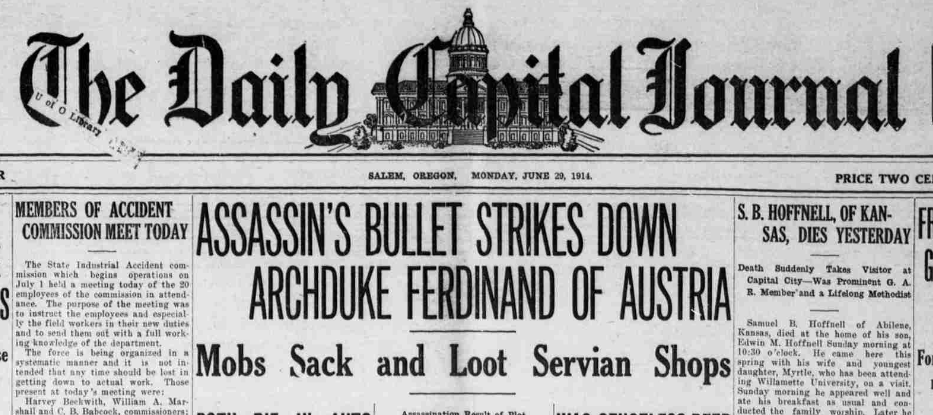
By Richard Van Pelt, WWI Correspondent
The lead headline read “Assassin’s Bullet Strikes Down Archduke Ferdinand of Austria”
Assassin jumps on Running Board of auto fires two shots at the Archduke-Long story of oppression.
Sarajevo, Bosnia, June 29. As a sequel to Sunday’s assassination of Archduke Francis Ferdinand of Austria and his wife, pro-Austrian mobs began rioting here today.
The people charged and extensive Serbian conspiracy against the archduke and Austrians generally, sacked scores of Serbian shops and were reported to have killed several Serbian residents. It was feared there would be a general slaughter when the murdered man and woman were removed from the Army Hospital for shipment to Vienna.
Other headlines addressed what “Was Senseless Deed”and then proceeded to state that “Peace Prospect Better”and the “New Heir’s Wisdom Doubted”and that the “Murder Causes Grief Throughout Europe and May Change Map – Was A Stern, Warlike and Pitiless Man.”“The passing of Francis Ferdinand has greatly bettered the prospect for continued peace in Europe,”was the statement today of Sir Thomas Barclay, England’s foremost international lawyer and originator of the Anglo-French ‘entente cordiale.’”
The “entente cordiale,”an agreement between France and England evolved in to the Triple Entente of Britain, France, and Russia, and was the coalition around which, three weeks after this article was publish, Europe would go to war.
Other front page headlines addressed civil war in Mexico. Events in Mexico would remain front page news for most of July.
Locally, “A grand street frolic closed the Cherry Fair Saturday night with a feast of merry making after 40,000 people had witnessed the first electrical parade that was ever attempted in any city in the state outside of Portland.”The paper went on to note that “the electrical parade fulfilled all expectations but the autos which were banked alongside the curbs compelled the crowds to surge into the streets where the lack of sufficient police permitted them to spill the effect of the parade. The floats could not be seen until they were directly opposite the spectator and no view of the entire parade was possible.”
Not every event at the Cherry Fair went as well as the parade: “Has Thumb Shot Off”the headline reported. “Woman Pulls Trigger and Man Jumps Around With Bleeding Fingers – People Thought Exhibition Part of Show.”“One of the assistants of the street show, which was conducted here during the Cherry fair by Silas Hoyt, was shot in the hand last Saturday night by Mr. Hoyt’s wife while he was in the act of holding up a small ball for Mrs. Hoyt to shoot at.”The paper noted that Mrs. Hoyt was a member of the “expert”rifle shots, “a troupe which featured the show.”
In a shorter article referencing the assassination, The Journal noted that scores were arrested in Sarajevo in connection killing of the archduke. “The authorities asserted they had conclusive evidence that the murders were the result of a well organized and widespread conspiracy, in which many were involved.”The paper reported that the assassin, Prinzip, and one of the collaborators, Cabrinovich, “maintained jaunty, debonair exteriors. They denied that they had accomplices or that their separate attempts had any connection with one another. Prinzip expressed no regret whatever for his deed, Cabrinovitch none but at the failure of the attempt.”
During the next weeks, the issue of the extent of Serbian involvement in the assassination would determine Austria-Hungary’s decision to hold Serbia responsible. To this day, no certainty exists as to the foreknowledge of the assassination by the Serbian government, though it is clear that rogue elements in the Serbian intelligence service and other parts of the government were complicit in the assassination.
An editorial entitled “The Trade Slaves”addressed the need to establish a work week that would emancipate these trade slaves. “A trade slave,”the editor wrote, “is a man or woman who must go to his or her business early in the morning and spend long hours each day waiting upon a lazy and exacting public that could make its purchases in two-thirds the time.”“Few things in life are more piteous than the listless girls, dispirited young men and gray-haired veterans of the city stores whose lives are narrowed down to their daily toil by a brutally selfish public.”“The joys of life are but things of their dreams,”noted the editorial. “We fill our mouth with phrases that have no meaning and the heart must stand voiceless”the editor eloquently wrote in arguing for a work week that would allow workers to “enjoy their families, take them out to the parks or into the country and enjoy some of God’s sunshine and the sight of green fields . . . and do a thousand and one things to get nearer to nature, to humanity and to God, and feel that it is sweet to be alive.”
The paper reported that in November voters would address 43 ballot measures. Eventually only twenty nine would actually make it on to the ballot.
Concurrently with reports in the newspapers here, this is the timeline for events leading up to the war.
In Serbia:
- Serbian Premier Pasic denounces the terrorist Black Hand group and orders all public meeting places closed – Belgrade wires its condolences to Vienna
- he Secretary of the Austrian Legation in Belgrade implicates the Serbs in Franz Ferdinand’s assassination
In Bosnia.
- The Bosnian Parliament condemns the assassination, and is then permanently dissolved by Austria-Hungary
Austria-Hungary:
- Anti-Serb riots erupt in Vienna, in Brünn, in Sarajevo and throughout Bosnia
- Hungarian Premier Tisza tells Berchtold that war would be a fatal mistake – Berchtold’s initial stance is moderate; he resists Conrad’s call for mobilization and decides to take no overt action until after the French leaders end their trip to Russia on Jul.23
Great Britain
- King George V decrees seven days of mourning for the slain Franz Ferdinand
Russia
- The Czar orders twelve days of mourning for Franz Ferdinand







Leave A Comment